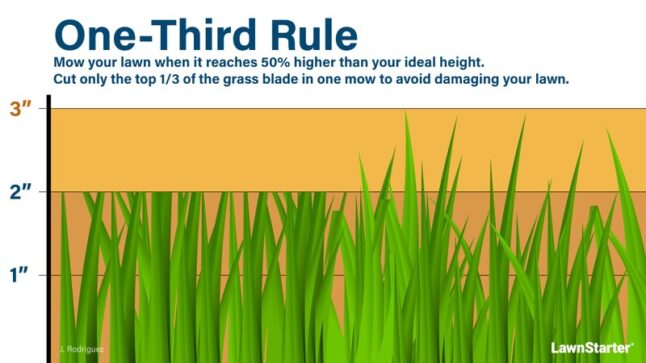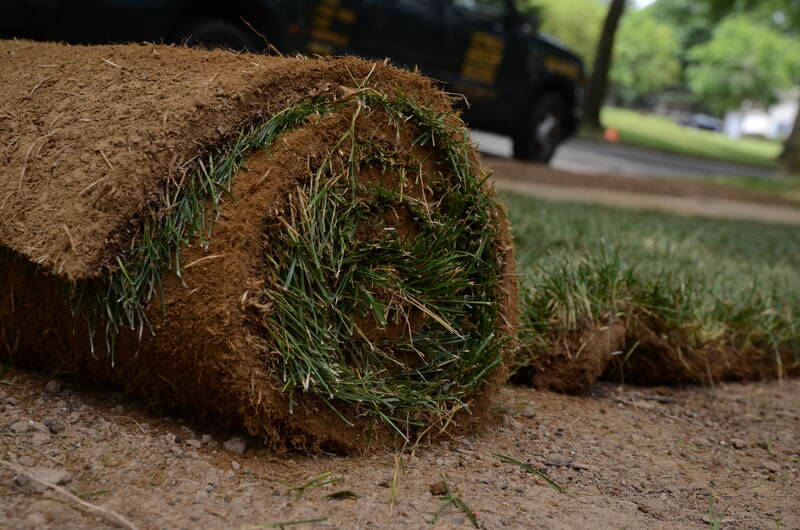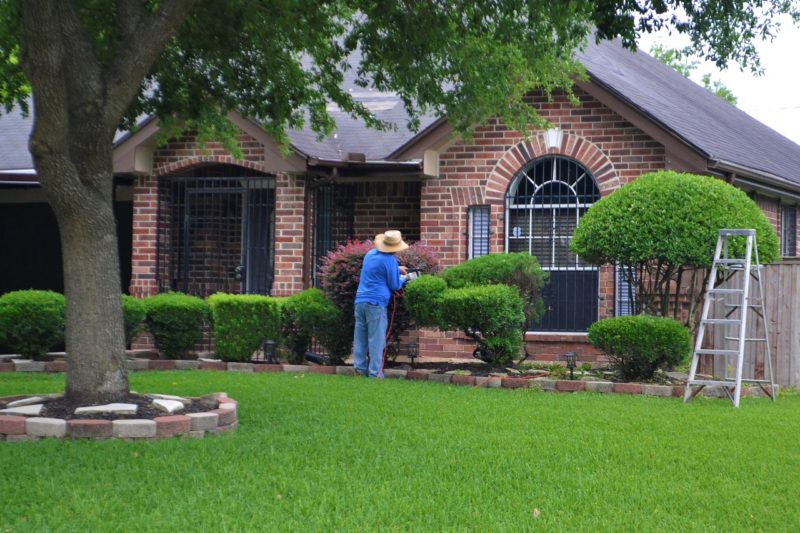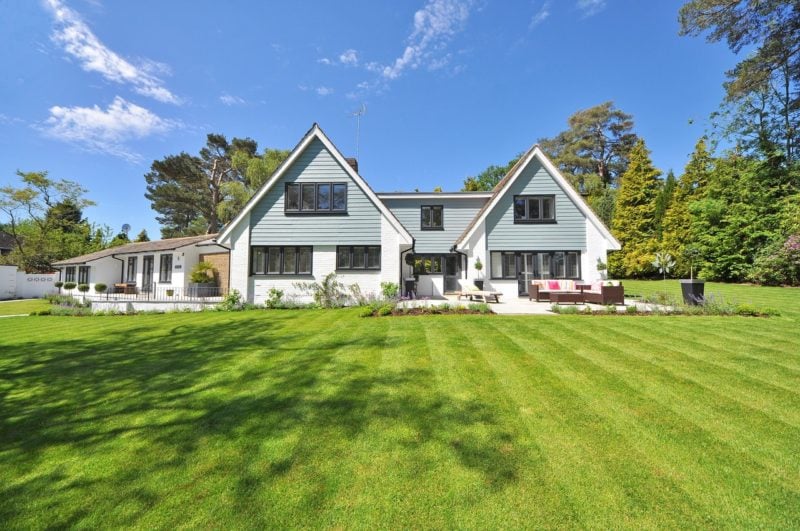Keeping your lawn healthy and beautiful can cost anywhere from $49 for basic mowing to $3,394 for more extensive services like sod installation. Prices will vary depending on the type of service you need.
Beyond the type of service, the size of your lawn and the specific features of your property can also influence the final price. Larger lawns naturally cost more to service, and obstacles such as slopes will increase the overall cost. On average, you can expect to pay $100 to $410 per month for lawn maintenance.
We’ve gathered data from different lawn care services across the U.S. so you can get a better estimate of the cost of your project.
Cost by Location
Different regions or climates can impact the overall cost of lawn care services. Some of the cost factors that influence the type of treatments needed include varying climates, grass types, demand, soil types and conditions, topography, and local regulations.
Additionally, the cost of living in your particular region can affect both material and labor costs.
The table offers a snapshot of the costs of lawn care nationwide. The lower end of the range reflects more affordable services like mowing, while the higher ned reflects larger projects such as sod installation, with more expensive grass types.
| City | Average Cost Range (Including Labor and Materials) |
| Northeast U.S. | |
| Pawtucket, RI | $49 – $3,379 |
| New York, NY | $59 – $3,964 |
| Southeast U.S. | |
| Dothan, AL | $44 – $3,086 |
| Orlando, FL | $45 – $3,144 |
| Atlanta, GA | $45 – $3,159 |
| Midwest U.S. | |
| South Bend, IN | $50 – $3,466 |
| Chicago, IL | $54 – $3,671 |
| Northwest U.S. | |
| Salem, OR | $48 – $3,305 |
| Seattle, WA | $55 – $3,744 |
| Southwest U.S. | |
| Houston, TX | $45 – $3,130 |
| Roswell, NM | $45 – $3,159 |
| San Diego, CA | $51 – $3,525 |
Note: These are general cost ranges, and your actual price might be very different depending on the service you need. You could end up on the lower, middle, or higher end of the range based on whether you’re booking basic mowing, dethatching, or larger projects like sod installation or multiple tree trimmings.
Cost by Service Type
Lawn care costs vary depending on the type of service, with mowing being one of the least expensive options. Some yard services require more labor and/or expensive equipment.
In the chart below, you’ll find the average cost most homeowners spend on lawn care and yard maintenance:
| Lawn Care Service | Average Cost |
| Mowing | $49 – $147 |
| Weeding | $50 – $210 |
| Fertilization | $67 – $405 |
| Dethatching | $65 – $165 |
| Aeration | $107 – $202 |
| Leaf removal | $107 – $435 |
| Mulching | $192 – $402 per cubic yard |
| Seeding | $427 – $1,514 |
| Hydroseeding | $0.07 – $0.21 per square foot |
| Sod installation | $2,028 – $3,394 |
| Tree trimming | $430 – $640 per tree |
| Bush trimming | $46 per bush |
| Sprinkler system | Installation: $0.29 – $0.48 per square foot Repair: $59 – $1,354 |
| Yard cleanup | $216 – $462 |
Mowing

While many homeowners can do their own yard work if they choose, professional lawn mowing services are more convenient and save you time.
On average, lawn mowing costs between $49 and $147 per visit or around $32 to $68 per hour. The larger your yard, the more expensive hiring a pro will be.
Weeding
Weeds make a lawn look ragged and unkempt. Keep crabgrass and dandelions out of your yard with chemical treatments, or hire a gardener to remove the weeds for you.
Depending on your lawn’s size and the control method you use, you can expect to pay between $50 and $210 for weed control. If you’re hiring a gardener to hand-pull the weeds, it will cost you around $35 to $105 per hour.
Fertilization
If the lawn looks greener across the street, your grass might not be getting all the nutrients it needs. A lawn care professional can test the soil and help you determine the best fertilization regimen for your lawn.
The total cost of your fertilizing treatment will largely depend on the size of your lawn. The average price of lawn fertilization ranges from $67 to $405.
Dethatching

Thatch is dead organic debris, such as leaves and grass clippings, that accumulate between the soil and turf. When it’s under half an inch thick, thatch helps conserve moisture and protects the soil.
But once the thatch reaches between a half inch and 1 inch, the buildup can block water and fertilizer from reaching the roots and can be a breeding ground for pests and lawn diseases.
For professional lawn dethatching, you can expect to pay around $65 to $165.
Aeration

When the soil is too compact, your grass doesn’t have good access to the vital resources it needs to flourish and be as green as it can be. Aeration loosens compacted soil, allowing air, nutrients, and water to reach grass rroots.
You can expect to pay between $107 and $202 for lawn aeration, with the national average cost being $154.
Leaf Removal
A mat of wet leaves doesn’t look good on any lawn, and it’s not healthy for the grass, either. On average, leaf removal costs between $107 and $435, depending on the size of your lawn, the type of cleaning used, the tree density, and other factors.
Mulching
Your flower beds and gardens will benefit from mulch. It helps retain moisture in the soil, limits erosion in the beds, and adds beautiful texture to the landscape.
Typically, mulch costs between $192 and $402 per cubic yard for professional installation, including delivery and labor.
Seeding
Does your lawn need new grass? Seeding is the most affordable option for homeowners looking for a fresh new yard on a budget. If you hire a professional to seed your lawn, you can expect the overall cost of your project to be anywhere from $427 to $1,514, depending on the size of your yard.
Hydroseeding
Planting grass through hydroseeding involves applying a mixture of seed, mulch, fertilizer, water, and soil amendments to the desired area. The mixture is called “slurry” and is often spread over large pieces of land or slopes where conventional seeding is challenging.
Professional hydroseeding costs range from $0.07 to $0.21 per square foot. It’s more expensive than conventional seeding but more affordable than installing sod.
Sod Installation

Unlike seeding, which can take one to two years to grow into a mature lawn, sod installation can provide you with a new yard instantly. On average, installing sod in a 1,000- to 1,500-square-foot lawn costs around $2,028 to $3,394, depending on factors such as the type of grass used.
Tree Trimming
Trees provide shade and a stately, established look to your home. But if they begin to look unhealthy or unsightly, your front yard may turn heads for the wrong reasons.
On average, tree trimming will cost between $430 and $640 per tree. Prices will vary significantly based on the tree’s size.
Bush Trimming

Just like your trees need trimming, so do your bushes. Keep them looking crisp and pristine by hiring a pro to trim back their branches. The typical cost for bush trimming is $46 per bush.
Sprinkler System

If you don’t have the time to water your lawn, a sprinkler system may be just what you need for your grass to stay healthy and hydrated. Installing a sprinkler system costs around $0.29 to $0.48 per square foot, so you can expect to pay $3,169 to $5,238 for a 1/4-acre lawn.
For lawns already equipped with sprinklers, homeowners can expect to pay around $59 to $1,354 for sprinkler repair, depending on the type of repair needed.
Yard Cleanup
Yard cleanup encompasses various services designed to tidy up your lawn, including tasks such as raking leaves, bagging yard waste, and removing trash and old furniture. On average, yard cleanup costs range from $216 to $462.
Cost per Month
Some lawn care companies offer weekly, biweekly, or monthly lawn care services. The average monthly or weekly maintenance cost will often be lower than paying for a one-time service.
For instance, the average monthly lawn care cost ranges between $100 and $410. Signing up for regular lawn care, such as a weekly mowing service, can help you save money compared to paying for a one-time service each week.
Pro Cost vs. DIY Lawn Care Costs
If you enjoy mowing your grass and tending to your yard, you’ll need to purchase several pieces of lawn care equipment.
The actual price of the equipment may vary depending on the type, power source, and features, so here’s a list of cost guides for commonly used lawn care equipment:
Tip: If you don’t already have these pieces of equipment at home, it might be more cost-effective in the long run to hire a professional service. Not only will you save on initial equipment costs, but also on potential maintenance and storage expenses.
Other Factors That Affect Cost
There are many factors that can impact the overall cost of your lawn care bill, making it higher or lower than the national average.
Let’s go over these determining factors in detail so you can better understand how your total lawn care bill may differ from the average homeowner’s.
Yard Size

The average lawn size is 8,712 square feet, or one-fifth of an acre. If your lawn is significantly larger or smaller than the average lawn size, you can expect your total lawn care cost to differ from the national average.
For example, most homeowners pay between $0.07 and $ 0.21 per square foot to hydroseed their lawn, or $610 to $1,830 per 1/5-acre. But if you need to hydroseed an area that’s larger than average, you can expect to pay much more than the national average cost of seeding.
The bottom line: Homeowners with large lawns will often spend more on lawn care than the average costs.
Obstacles in Your Yard
A lawn care professional may raise their rates if obstacles in the lawn make their job more difficult. Old tree stumps or large tree roots can slow down the task at hand.
For example, if you’re having sod installed, a professional will require more time and labor to ensure the sod aligns with the surrounding obstacle.
Lawn’s Current Condition
For some lawn care services, the healthier you keep your lawn, the less you may need to pay.
For example, if you’re not maintaining your lawn with the proper dethatching, aeration, or watering regimen, then you may have to spend more money on pest control and fighting off lawn diseases. Or, if you haven’t had your lawn mowed in weeks, you may be charged a higher fee to cut the overgrown grass.
Lawn Care Provider’s Experience
A service provider’s training, experience, and expertise can affect your total lawn care costs. If you’re hiring a pro who is new to the industry, you can expect their hourly rate to be much less than hiring a pro with years of experience. Keep in mind that hiring a more experienced professional is likely to provide better results.
Packaged Plans
Many pros provide additional services as part of a recurring lawn care plan. A basic lawn care package plan may include mowing, fertilizing, and aeration, all at a lower cost. Instead of paying for each service separately, think of recurring package plans as buying lawn care in bulk.
FAQ
There are many benefits to hiring a lawn care professional, including:
● Convenience: For many homeowners, hiring a lawn care professional takes the lawn care burden off their shoulders. Not everyone wants to spend Saturday mornings pushing a lawn mower and sweating under the hot sun.
● Time saver: Taking care of your lawn eats up a lot of time. Your week is filled with a heavy work schedule, putting food on the table, and paying the bills. Don’t let lawn care take away the precious hours you finally get to spend with family and friends.
● Better lawn health: A healthy lawn is a beautiful lawn. When you have a professional on the job, you know your grass is getting everything it needs to grow, flourish, and get the neighbors’ attention.
● Professional results: Many lawn care solutions are easy DIY projects. While they may save you a few dollars, your lawn may be missing the special touch only a professional has. If you’re looking to have the best lawn on the block, hiring a professional can help boost curb appeal.
The best time to water your lawn is before 10 a.m. If you water your lawn any later, the hot sun may evaporate the water before it has time to replenish the roots. Avoid watering your yard late in the day or at night, as droplets may settle on the grass blades overnight and encourage disease.
The key to a healthy lawn with a deep root system is to water infrequently but deeply. Watering frequently for a short period won’t encourage your turf to develop a deep root system.
To determine your lawn size, measure its length and width (in feet) before multiplying the two numbers. For example, if your lawn has a length of 50 feet and a width of 30 feet, its size is 1,500 square feet. If your lawn has irregular shapes, you can measure it in small sections and just add the results.
Most lawn care companies base their fees on the square footage of the lawn. So, if you know the correct size of your lawn, you’ll get more accurate cost estimates.
Let a Pro Take Care of Your Lawn
To keep your grass healthy and beautiful, consider hiring a reliable lawn care company. It’s a convenient and time-saving solution that gives you peace of mind.
Book a local lawn care professional today so you can put your push mower back in the garage and start enjoying your yard without lifting a finger to maintain it.
Note: LawnStarter may get a referral fee for matching you with contractors in your area.
Maria Isabela Reis contributed to this article.
Main Photo Credit: Pixabay